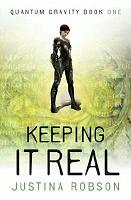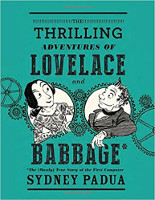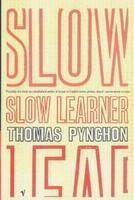 Justina Robson is an English SF author, and one of the rising stars of the genre, with now 9 Novels and 1 non-fiction book to her name. And whilst some of her books are considered to be 'Hard' SF (I would dispute this, but let's not bicker about definitions here) the one at hand falls squarely in what is coming to be termed 'Science Fantasy' – more on the what and why below. Keeping in Real is the first book in the Quantum Gravity series, which is running to 5 books as this is written.
Justina Robson is an English SF author, and one of the rising stars of the genre, with now 9 Novels and 1 non-fiction book to her name. And whilst some of her books are considered to be 'Hard' SF (I would dispute this, but let's not bicker about definitions here) the one at hand falls squarely in what is coming to be termed 'Science Fantasy' – more on the what and why below. Keeping in Real is the first book in the Quantum Gravity series, which is running to 5 books as this is written.
The book kicks off with a prequel titled 'Common Knowledge' – you've gotta love honesty: here's the information dump you need to make some sense of what's to come. Nothing wrong with that...
The common knowledge is that in 2015 (the story itself plays in 2021) there was a Quantum Explosion (no, me neither) in a Superconducting Supercollider, tearing a hole into the fabric of Spacetime, and irreversibly altering the fabric of the Universe. Where there was only one universe before, there are now 6 parallel and connected realities/universes, all with a full history extending way beyond the event which, apparently, split them into existence. Ours is known as Otopia, the other ones are Zoomenon (Elementals, inimical to human life), Alfheim (Elves, borders closely controlled, diplomatic relations), Demonia (Demons, borders open, scientific co-operation), Thanatopia, the crossing into which requires the death of the traveller and is thus limited to trained Necromancers, and finally we have Faery (as it says on the tin). And so it comes to be that we have a future world, with advanced technology, but also with magic, Elves, Faeries, Elementals, Dragons... it's a rather disconcerting mix at times.
Knowing this the story can kick off – Zal is an Elf, famous in Otopia as singer in the X-Mode Rock band The No Shows. As a rule, Elves don't rock, no-one knows why Zal can/does. But not everybody is happy with this state of affairs, especially in Alfheim. Zal is receiving death threats, on magical paper. Is he just an embarrassment to Alfheim and/or his family, or is the rumour of a great Sundering Spell, designed to break the realms apart, really true?
Lila is half machine (read: battle robot) after a 'diplomatic incident' in Alfheim. What's left of the human in her is also affected by magic, and she is not sure as to who she is anymore, but all the more sure that she is ugly, a monstrosity. She is insecure, and appears to be always slightly out of control, not fully at ease with her abilities and her role (and the tag of ‘Half robot, all attitude’ on the back cover is ever so much rubbish concocted by a marketeering droid, I reckon…) She works for Incom, the Otopian National Security Agency, Intelligence and Reconnaissance Division (it was also them who rebuilt her into what she is now). Given the severity and possible implications of the situation she is assigned, under cover, as bodyguard to Zal, to prevent whatever is threatened/threatening to take place.
The book left me in two minds in regards to the rather important question if I liked/ejoyed it – on the one hand there is decidedly a good story being told, and a well executed plot (which points straight past the end of the book at the next one in the overall story arc), and I rather liked the mixed setting and the ongoing journey of discovery about this world/these worlds and their interrelations. On the other hand I found that the characters didn't engage me at all, and it's rarely a good thing if you couldn't care less if your protagonist lives or dies...
The Elves in this universe cannot stand the (apparently rather frequent) LOTR jokes and allusions – but Robson is, all the same, happily stereotyping away, again and again. One thing that also stood out for me was the callousness regarding the life of fellow beings, especially by Elves for Elves – including loved ones; purpose and 'needs must' seems to trump feelings and association easily and any time, which, given the many layers of loyalties and loyalty conflicts in the story leads to rather hard to accept/believe situations and decisions. This is in line with the occasional logical gaps and inconsistencies in the story, where you have to suspend your disbelief even beyond the already fantastic setting.
The protagonists behaviour and motivations change a lot, and I didn't always feel that this was aligned with character development and the frequent story twists and conflicting loyalties (which in itself appears to be a core theme here).
So, overall, where does this leave me? Some of Justina's writing that I have read I really liked (Natural History springs to mind as especially impressive example), whilst I have mixed feelings about Keeping it Real – the book was, for all its good sides, not an unmitigated pleasure. I have ordered the 2nd book in the series; let's see how the story – and the writing – develop. I reserve my judgement, you are more than welcome to make your own!
Title: Keeping it Real
Series: Quantum Gravity
Series Number: 1
Author: Justina Robson
Reviewer: Markus Thierstein
Reviewer URL: http://thierstein.net
Publisher: Gollancz/Orion
Publisher URL: http://www.orionbooks.co.uk
Publication Date: 2006
Review Date: 110219
ISBN: 057507907X
Price: UKP 6.99
Pages: 279
Format: Paperback
Topic: SF
Topic: Fantasy













